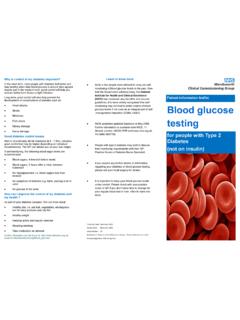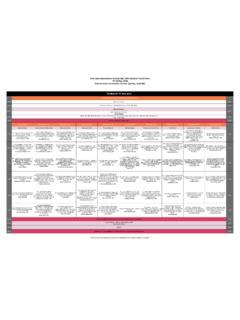Transcription of A Guide to Prescribing Adult Oral Nutritional …
1 Page 1 A Guide to Prescribing Adult oral Nutritional Supplements (ONS) in the Community Page 2 Contents Introduction .. 3 Appropriate Use of oral Nutritional Supplements (ONS), including ACBS Prescribing Criteria .. 4 ONS Flow Chart .. 8 Assessing Underlying Causes of Malnutrition .. 9 Formulary .. 10 References and Further Reading .. 15 Appendices: 1. Cost per 100kcal of ONS .. 16 2. Use of ONS in Substance Misusers .. 17 3. 6 Steps to Appropriate Prescribing of ONS .. 19 4. Choosing a Standard ONS .. 21 5. Adapted MUST (Malnutrition Universal Screening Tool) .. 22 6. Food First Dietary Advice Leaflets .. 23 7. 300kcal Snacks and Nourishing Drinks .. 25 These guidelines are meant to be used with patients and as a reference document. The food fortification leaflets are enclosed in the appendices and extra ones can be obtained from the Community Services Wandsworth Primary Care Prescribing Lead Dietitian on 0208 812 4053/4155 or Wandsworth Clinical Commissioning Group Pharmacy Team on 0208 871 5144/5151 Document prepared by: Auline Cudjoe, Primary Care Prescribing Lead Dietitian Rajiv Dhir, Senior Prescribing Advisor Produced March 2013; Review March 2015.
2 Page 3 Introduction Malnutrition is estimated to affect at least three million adults in the UK and cost 13 billion per annum. It may occur as a result of illness or from a variety of physiological and social co-factors. Adverse effects include: Impaired immune responses increasing risk of infection. Reduced muscle strength and fatigue. Reduced respiratory muscle function - increasing the risk of chest infection and respiratory failure. Impaired thermoregulation - predisposition to hypothermia. Impaired wound healing and delayed recovery from illness. Apathy, depression and self-neglect. Increased risk of admission to hospital and length of stay. Poor libido, fertility, pregnancy outcome and mother child interactions The current cost of Adult oral Nutritional supplement Prescribing in NHS Wandsworth is 817, (June 2011-May 2012), and without systems in place to monitor and review patients prescribed ONS it is predicted that the expenditure will continue to rise 8% per year.
3 London audit data indicates between 57-75% of prescriptions are inappropriate, based on Advisory Committee for Borderline Substances (ACBS) Prescribing criteria and dietetic clinical judgement. In addition to savings associated with reducing inappropriate ONS Prescribing , an analysis by the National Institute for Health and Clinical Excellence (NICE CG32) suggests that improving the treatment of malnutrition has the third highest potential to deliver cost savings for the NHS. ( ; ). The management of ONS is a multi-factorial and complex issue. As increasing resources are being spent on prescriptions, there is an acknowledged need to optimise Prescribing habits to ensure cost effective Prescribing , minimise waste whilst ensuring safe, high quality care. Page 4 Appropriate Use of oral Nutritional Supplements (ONS) Key Messages Provide patient with the food first diet sheet ONS are for the use with high risk patients as assessed by using MUST Avoid Prescribing 1kcal/ml supplements Fortimel ,Ensure can or Fresubin Original Provide 1 week s supply initially to establish patient preference and to avoid wastage refer to formulary for product choice Review monthly thereafter If no improvement in outcomes after 2 months, refer to a dietitian Two supplements per day are recommended A variety of flavours will help prevent taste fatigue Not all ONS are suitable for vegans and many are not kosher, gluten free and lactose free, or suitable for patients with specific food allergies.
4 Check the BNF for product details Patients with a BMI of or less or at high risk of re-feeding syndrome or for whom supplements are a sole source of nutrition should be referred to local dietetic services for assessment Patients in the final weeks of life are unlikely to benefit from an ONS prescription. Over the counter (OTC) supplements like Build Up , Complan , Food link , Nutriment or Nurishment can be suggested as alternatives if required Patients with complex Nutritional needs ( renal disease, gastrointestinal disorders) may require specialist products and should be referred to local dietetic services Contact local dietetic services before switching products for patients under dietetic care Page 5 oral Nutritional Supplements (ONS) should only be prescribed to patients who meet the Advisory Committee for Borderline Substances (ACBS) Prescribing criteria (see below) and have been screened using a local malnutrition screening tool, Malnutrition Universal Screening Tool ( MUST ) and deemed to be at Nutritional risk.
5 MUST is a validated, NICE approved tool for screening for malnutrition and risk of malnutrition. This tool is available from ACBS Indications for oral Nutritional Supplements Short bowel syndrome Intractable malabsorption Pre-operative preparation of patients who are undernourished Proven inflammatory bowel Following total gastrectomy Dysphagia Bowel fistulas Disease-related malnutrition Continuous ambulatory peritoneal dialysis (CAPD) Haemodialysis oral Nutritional Supplements are often prescribed for patients while in hospital. ONS may be included on the discharge drug summary and a small supply provided for the patients to take home. In the absence of written correspondence from the hospital dietitian, patients should be assessed using a local malnutrition screening tool, such as MUST prior to continuing to prescribe ONS commenced by secondary care. oral Nutritional Supplements for Nutritional support should be considered in people who are malnourished, as defined by any of the following: Body Mass Index (BMI) of less than kg/m2 Unintentional weight loss greater than 10% within the last 3 6 months BMI of less than 20 kg/m2 and unintentional weight loss greater than 5% within the last 3 6 months Eaten little or nothing for more than 5 days or unlikely to for the next 5 days, or Poor absorptive capacity and /or high nutrient losses and/or increased Nutritional needs, catabolism.
6 Page 6 The following patients are at risk of developing re-feeding problems and should be referred to the community dietetic service without delay. Patients: With a BMI of kg/m2 or less Who have had little or no Nutritional intake for less than 10 days Who have lost more than 15% of their body weight within the last 3-6 months, except patients at the end of their lives For whom supplements are the sole source of nutrition should also be referred to the dietetic service. Once Nutritional risk has been established, the underlying cause and treatment options should be assessed (see Guide to assessing underlying causes of malnutrition (see page 9). A food first approach should be used initially and patients reviewed after 4 weeks prior to initiating ONS (see ONS Flow Chart for guidance on page 8). Supplements should not be used as first line treatment, unless they are being prescribed only for patients who have a HIGH risk of malnutrition and who have lost weight despite trying dietary modification.)
7 Avoid Prescribing 1kcal/ml sip feeds. These contain less Nutritional benefit and are not as cost effective as kcal/ml products (see page 12-14 for the formulary of preferred products). Clear goals and a care plan should be set with patients prior to starting ONS. An initial prescription of a week s supply or trial pack should be dispensed to avoid wastage, in case of products not being well tolerated. Repeat prescriptions should be avoided, supplements should be prescribed acutely and patients reviewed regularly ( monthly). The following parameters should be monitored: Weight (If unable to weigh the patient, use other measures to assess if weight has changed, mid upper arm circumference, clothes or rings looser/tighter, visual assessment) Changes in dietary intake Compliance with ONS and stock levels at home. Patients should be advised to take supplements between meals and not as a meal replacement to maximise their benefit.
8 Avoid Prescribing less than the clinically beneficial dose of 2 bottles a day which will provide an extra 500-600kcals/day. Once daily prescriptions only provide 250-300kcals which can easily be met with food fortification enriched milk (1 pint full cream milk with 4 tablespoons of milk powder added). NB some powdered products such as Scandishake ; Enshake and Calshake are higher in calories so only 1 sachet is required to provide 500-600kcals. NB: Please be aware that there is no additional benefit from Prescribing above TDS unless referred for dietetic assessment. It is important to reassure patients that the dietary needs of the undernourished are different to that of the healthy population and that they should eat foods they might perceive to be unhealthy full fat dairy products. Page 7 Patients with complex Nutritional needs ( renal disease, gastrointestinal disorders) may require specialist products and should be referred to local dietetic services.
9 Patients with swallowing problems should be referred to Speech & Language services for assessment. Patients with diabetes can be given milk based or savoury supplements. Patients should be advised to sip the supplement slowly over 20-30 minutes. Blood glucose levels will need careful monitoring and medication may need to be adjusted accordingly. Fruit juice based supplements ( Fortijuce, Resource Fruit, Fresubin Jucy) should be avoided due to their high sugar content/glycaemic load. In some instances patients may not be able to tolerate milk and require a supplement and therefore juice maybe the only alternative, patients should therefore be advised to monitor their blood sugars regularly Supplements should be discontinued once the patient has reached their agreed treatment goals. One review after discontinuation of the supplements is good practice to ensure non recurrence of the original problem. Over the counter supplements such as Build Up , Complan , Nutriment , Nurishment can be recommended for patients who do not meet the ACBS criteria unless contraindicated, renal disease or diabetes, those in the final stages of life, or wishing to have supplements and these are no longer indicated.
10 Care should be taken when Prescribing supplements in substance misusers as once started, ONS can be difficult to stop. Supplements are often used to replace meals and therefore can be of negligible clinical benefit. Clear goals should be set for patients who meet Prescribing criteria (see Appendix 2). Care homes should provide adequate quantities of good quality food, so the use of unnecessary nutrition support is avoided. ONS should not be used as a substitute for the provision of food. Suitable snacks, food fortification as well as OTC products can be used to improve the Nutritional intake of those at risk of malnutrition. Page 8 ONS Flow Chart If the above does not apply assess underlying causes, set goals and give first line dietary advice on food fortification as appropriate Patient identified via MUST as having a score of 2 or more should be referred to dietetic services Improvement, weight stable or increasing and/or appetite improved: Reinforce advice Reassess after one month No improvement, still losing weight and/or no improvement in intake: Reinforce advice Reassess underlying problems and treat Trial ONS, Complan Shake or Fortisip Compact as first line as per guideline (if meets ACBS criteria) in addition to fortified foods.







